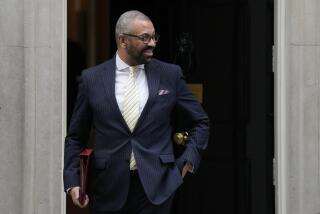Britain Issues Criteria for Deportation
- Share via
LONDON — Britain will deport any noncitizen who foments, justifies or glorifies terrorist violence, Home Secretary Charles Clarke said Wednesday, unveiling toughened criteria for remaining in the country in response to the attacks on the transit system.
The pronouncement, aimed mainly at radical preachers, evoked criticism from civil liberties groups, who said the new standards could infringe on Britain’s culture of free speech and erode liberties. They also expressed concern that some dissidents could face torture if sent back to their native countries.
“Individuals who seek to create fear, distrust and division in order to stir up terrorist activity will not be tolerated by the government or by our communities,” Clarke said as he presented the specific guidelines on “unacceptable behavior.”
Clarke said the first deportations could take place in the next few days.
The guidelines will also be used to deny entry to Britain.
The changes follow the July 7 attack on London’s bus and subway system that killed 52 people and the four bombers and an unsuccessful bombing attempt two weeks later.
In determining offenders, Clarke said, the government will take into account communications such as sermons, writings and websites. He said he meant to send a strong message that “those who seek to foster hatred or promote terrorism ... are not welcome” in Britain.
According to the guidelines, which followed a two-week period of public consultation, a ban or deportation may be ordered for any non-Briton using any medium to “foment, justify or glorify terrorist violence in furtherance of particular beliefs; seek to provoke others to terrorist acts; foment other serious criminal activity or seek to provoke others to serious criminal acts; or foster hatred which might lead to intercommunity violence” in Britain.
The rules do not require parliamentary approval because the home secretary already has discretion to exclude any foreigner deemed not conducive to the “public good.”
Clarke denied that the rules would be applied in a way to “stifle free speech or legitimate debate about religion or other issues.”
After the July attacks, Britain was faulted at home and abroad by critics who said that it had given sanctuary and even citizenship to radical Islamists who sometimes advocated violence. To some, London had been turned into a hotbed of Middle East radicalism, a so-called “Londonistan.”
These critics said Britain had allowed too much leeway to Middle Eastern clerics such as Abu Hamza al Masri and Omar Bakri Mohammed who celebrated suicide bombings, including the Sept. 11 attacks on the United States, and encouraged young Britons to travel abroad to train with the Taliban and Al Qaeda.
After three of the July 7 bombers turned out to be British-born, Prime Minister Tony Blair indicated that there was a need for change in that policy.
However, some groups have argued that Britain risks running afoul of international conventions on asylum and protections against torture.
Clive Stafford Smith, a prominent human rights lawyer, said it was “unfortunate that the response to this tragedy from Britain is for us to abandon our commitment against torture.”
“For example, if you look at what Clarke has done, he ignores the torture convention: It’s simply illegal to deport people to countries where you have a reasonable basis to fear they’ll be tortured.”
“I don’t think it does us any good when we start violating the law in the name of protecting it,” Smith said in a telephone interview. “It doesn’t make us any safer.”
The Muslim Council of Britain, a mainstream umbrella group, also expressed unease. “It would be more prudent to bring persons who threaten the peace and security of the realm, whether resident or visiting, to trial under our own laws,” the council said.
Amnesty International believes the “vagueness and breadth of the definition of ‘unacceptable behavior’ and ‘terrorism’ can lead to further injustice and risk further undermining human rights protection,” Halya Gowan, the organization’s deputy director for Europe and Central Asia, said in a statement.
Opposition parties generally supported the government’s action.
The Conservative Party’s shadow home secretary, David Davis, urged that the measures be used “robustly and effectively,” British media reported.
More to Read
Sign up for Essential California
The most important California stories and recommendations in your inbox every morning.
You may occasionally receive promotional content from the Los Angeles Times.













